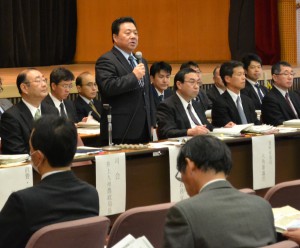
Parliamentary Vice Minister of Agriculture, Forestry and Fisheries Hidemichi Sato addresses a meeting in Kumamoto on Thursday, Jan. 7.
The Ministry of Agriculture, Forestry and Fisheries started a campaign in the city of Kumamoto on Thursday, Jan. 7, to explain the Trans-Pacific Partnership agreement, its impact on domestic farm production and the government’s measures to cope with expected changes.
Many of some 200 participants at the meeting, mainly officials of farm co-ops and local governments in the Kyushu region and Okinawa Prefecture, voiced concern over the government’s estimate on the impact of the agreement, which predicted that the current volume of domestic agricultural production can be maintained through the government’s support measures even after the agreement takes effect.
Some asked for estimates that do not take the government’s measures into account, and some questioned the consistency between the agreement which will abolish 80 percent of tariffs on farm products and the government’s goal of improving food self-sufficiency rate.
At the meeting, the ministry explained the government’s measures to assist farmers coping with market liberalization under the agreement. The measures include projects to support growers of all types of agricultural products and livestock farmers working to shift to more profitable crops and farming systems.
The ministry also said the nation’s agricultural losses as a result of the TPP agreement are estimated at 130 billion to 210 billion yen in terms of value, much less than the previous estimate. The ministry explained that the new estimates are made in view of tariffs and safeguard measures which will be maintained even after the agreement takes effect, as well as the government’s support measures.
Many attendants pointed out the government’s estimate is doubtful, as it is not clear how much effect the government’s measures will have to sustain production. They added that the government should come up with projections excluding the expected effect of the measures, but ministry officials responded that such projections would be “unrealistic and inappropriate.”
As for the consistency between the TPP agreement and the government’s goal of increasing the nation’s food self-sufficiency, the officials stressed that the government’s measures give top priority to maintaining production of ambitious farmers, which will lead to improvement in food self-sufficiency.
“We will work on measures to help the agriculture industry so that they can make the TPP an opportunity to maintain business and develop more and more,” said Parliamentary Vice Minister Hidemichi Sato.
The ministry plans to hold the meeting in nine regions nationwide by Tuesday, Jan. 19, and also start having similar meetings in every prefecture to provide chances for municipal governments, farmers and local agricultural associations to exchange opinions with the ministry. The move is aimed at sweeping away anxieties among the farm sector by carefully explaining the contents of the TPP agreement and how the government is trying to cope with it.
The ministry’s campaign in prefectures will kick off in Aichi Prefecture on Friday, Jan. 8, and go on until Wednesday, Feb. 10, in Saga Prefecture. The meeting in Aichi will be held jointly with the one for the Tokai region. At each meeting, ministry officials will first explain the outline of the government’s measures and then describe them in detail according to each category, such as rice, other crops, horticulture and livestock farming.
Prior reservation is necessary to attend the meetings. Those who wish to attend should contact regional agricultural administration offices or district agriculture offices. Those in Hokkaido should contact the Hokkaido District Agricultural Office’s planning and coordination office, and those in Okinawa should contact the Agricultural Administration Division in the Agriculture, Forestry and Fisheries Department of the Cabinet Office’s Okinawa General Bureau. The dates and locations of the meetings are available on the ministry’s website.
The government unveiled an outline of measures in November to help domestic industries cope with the effects of the TPP pact. The government allocated funds for implementing more urgent measures in the fiscal 2015 supplementary budget draft which was submitted to the Diet on Monday, Jan. 4.
(Jan. 8, 2016)

